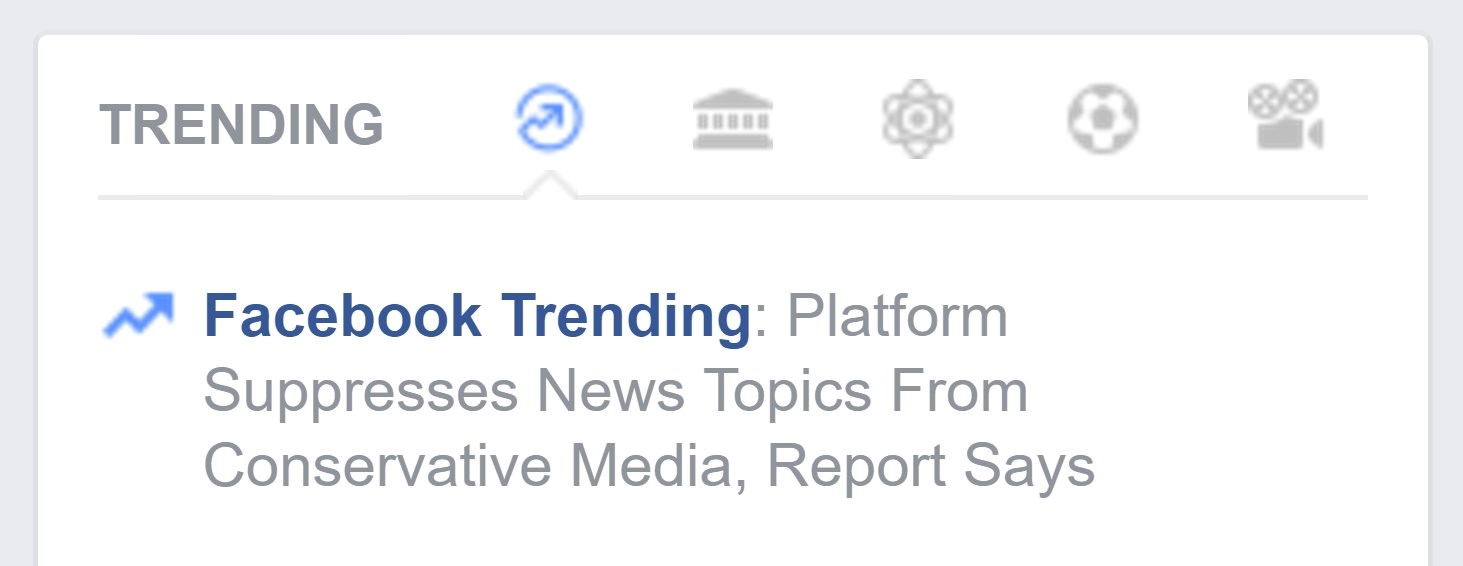Facebook is under fire for allegedly manipulating its “Trending Topics” section to reduce the visibility of conservative topics and stories about the social media platform, according to a story published by Gizmodo based on interviews with several former Facebook contractors who were not identified. The company has categorically denied these allegations, but that hasn’t stopped many commentators from criticizing Facebook for secretly injecting bias into its users’ feeds.
I have no idea whether Gizmodo’s scoop is accurate, but I can certainly sympathize with journalists and consumers who don’t want left-leaning curators filtering the stories they learn about. (If the allegations are true, who knows how many stories about former IRS official Lois Lerner I missed out on because Facebook curators “deep-sixed” the topic?!)
But what’s more troubling than Gizmodo’s Facebook story is the Senate Commerce Committee Chairman John Thune (R-SD) sending the company a letter on Congressional letterhead demanding that Facebook explain its curation policy and what, if anything, it’s doing to “investigate” allegations that it filtered conservative stories.
Although Sen. Thune is a longstanding supporter of free markets and limited government involvement in the Internet and telecommunications sectors, the decision to turn Facebook’s alleged transgressions into a public policy matter is problematic. Chairing a powerful Senate committee brings with it a bully pulpit that often tempts elected officials to pry into affairs properly left to the marketplace, as I discussed years ago when former Sen. Joe Lieberman successfully pressured Amazon to terminate service to Wikileaks — despite the absence of any judicial determination at the time that the website had violated any laws.
The letter suggests that Facebook may have “misl[ed] the public” if its curators prevented right-wing stories from reaching the Trending Topics section. Although Sen. Thune doesn’t point to any law or regulation that Facebook might have violated, the letter seems to imply that the filtering of conservative stories might constitute an “unfair or deceptive act[] or practice [] in or affecting commerce,” contrary to Section 5 of the Federal Trade Commission Act of 1914.
As far as I can tell, however, Facebook never represented to its users that the Trending Topics section was free from curation. Although a “trend” can be driven solely by users, favoring certain newsworthy stories (such as the Charlie Hebdo attack) or certain media outlets (such as the New York Times) is another approach to identifying which stories are “trending.”
One could, I suppose, argue that Facebook engaged in deception by omission — it didn’t explain that Trending Topics are actively curated — but do many consumers really believe that “trending” stories are entirely free from curation, based entirely on their popularity with users? I doubt it.
More importantly, however, Facebook enjoys the right under the First Amendment to engage in editorial discretion with respect to the content it features on its social network, free from government manipulation — including political fishing expeditions. As Mercatus Center fellow Brent Skorup has explained at length, online intermediaries enjoy rights similar to those of newspapers to make editorial decisions about the messages they distribute and highlight. Just as the Supreme Court has held that newspapers don’t have to give space to politicians who want to rebut editorials they dislike, Facebook doesn’t have to give conservative news stories equal treatment when it decides which stories to list as Trending Topics.
Of course, by the same token, conservatives are free to stop using Facebook, or start their own social network — just as Facebook did when it upended MySpace a decade ago. Nor does it matter that Facebook supposedly curated its Trending Topics without informing its users, because non-commercial speech cannot be “false or misleading” by its nature — instead, it’s held to a more protective standard articulated by the Supreme Court in New York Times v. Sullivan.
Unfortunately, many large Internet companies have been inconsistent in supporting the right of service providers to curate the speech that traverses their platforms. Back in 2012, CEI joined TechFreedom, the Cato Institute, and the Free State Foundation in defending online service providers’ First Amendment rights in an amicus brief we filed with the US Court of Appeals for the DC Circuit. However, the Open Internet Coalition — which included Facebook among its members — filed a brief on the opposite side, dismissing the First Amendment arguments of Internet service providers as bogus.
Although it may be tempting to see Facebook get a dose of its own medicine, so to speak, elected officials who believe in limited government and free markets should respect the constitutional rights of all interactive computer services to manage their platforms as they see fit.
Source: Congress, Not Facebook, Is the Real Threat to Free Speech | Foundation for Economic Education


Pingback:Congress, Not Facebook, Is the Real Threat to Free Speech | megalextoria